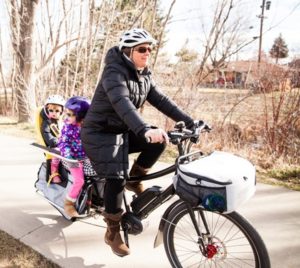E-bikes, also known as electric-assist bikes, are becoming more and more popular throughout the U.S. E-bikes increase opportunities for transportation, recreation and exercise, especially for people with physical limitations due to age, health issues, or fitness. They can also make bicycling more comfortable for people who struggle riding in hilly areas, which New Hampshire has a lot of. The information below summarizes New Hampshire’s laws* regarding the use of e-bikes.
(*N.H. Rev. Stat. §259:6, 259:27, 265:144, effective as of August 18, 2019.)
NH E-BIKE LAWS FOR ROADS
- New Hampshire designates these three classes of e-bikes, according to national guidelines:
Class 1: A bicycle equipped with an electric motor, of 750 watts (1 HP) or less, that provides assistance only when the rider is pedaling, and that ceases to provide assistance when the e-bike reaches 20 mph.
Class 2: A bicycle equipped with a throttle-actuated electric motor, of 750 watts (1 HP) or less, that may be used to provide assistance until the e-bike reaches 20 mph.
Class 3: A bicycle equipped with an electric motor, of 750 watts (1 HP) or less, that provides assistance only when the rider is pedaling and that it ceases to provide assistance when the e-bike reaches 28 mph. A factory-installed speedometer is also required.
- E-bikes are regulated like bicycles. The same rules of the road apply to both e-bikes and traditional bicycles that are solely human-powered.
- A Class 1 or Class 2 e-bike may be ridden on bicycle or multi-use paths where bicycles are permitted. Class 3 e-bikes are only allowed on roadways, unless otherwise allowed by the local authority.
- E-bikes are not subject to registration, licensing or insurance requirements that apply to motor vehicles.
- You must be 16 years or older to operate a Class 3 e-bike.
- Helmets are required for operators or passengers of Class 3 e-bikes under the age of 18. For Class 1 & Class 2 e-bikes, the same helmet law as for traditional bikes is required (i.e. helmets are required for anyone under the age of 16).
- A city, town or state agency that has jurisdiction can restrict where e-bikes are allowed for safety reasons or to protect natural resources. When in doubt, check local rules and regulations.
NH E-BIKE LAWS FOR TRAILS
- LOCAL: Consult your local land management agency.
- STATE: The New Hampshire Bureau of Trails does not currently have a law or policy specifically addressing e-bikes. In general, though, e-bikes are defined as motorized vehicles. Contact the department for the most up to date information. People for Bikes and the Bike-Walk Alliance of New Hampshire monitor this policy and will update this document as needed.
- FEDERAL: The majority of public lands managed for recreation in New Hampshire are under the jurisdiction of the U.S. Forest Service, where eMTBs are considered motorized vehicles and only have access to motorized trails. Contact the U.S. Forest Service Eastern Regional Office for more information as rules are being revised to allow greater use of e-bikes on federal lands.
eMTB GUIDELINES
- On federal, state, county and local trails, e-mountain bike (eMTB) access varies significantly.
- Generally, any natural surface trail that is designated as open to both motorized and non-motorized use is also open to eMTBs.
- eMTBs may not be allowed on trails managed for non-motorized activities.
- Ride legally and only on authorized trails.
- When in doubt, ask the local land manager about eMTB use on specific trails. Local land rules may change frequently.
eMTB RIDES IN NEW HAMPSHIRE
Here are just a few great places to ride eMTBs in New Hampshire:
- Green Woodlands Foundation (Class 1 only), Dorchester, 60+ miles
- Parker Mountain Trails, Littleton, 23 miles
- Rockingham Recreational Rail Trail, Manchester, 28 miles
- Bartlett Experimental Forest Road, Bartlett Village, 4 miles
- Sawyer River Road, Bartlett Village, 4 miles
WHAT E-BIKE RIDERS SAY
“We bought e-bikes so we could ride the same paths we rode 30 years ago. — Lee, Salem NH
“Our e-bikes make it easier and safer to use for transportation and exercise. We tried scooters before, but they were too big, required more maintenance, and didn’t provide any exercise.” — Ken, Hampton NH
“My e-trike offers a lot of stability and makes the inclines over the North and South Bridges on the rail trail a lot easier. The recumbent is comfortable and it gets a lot of positive comments!” — Chuck, Keene NH
“At 67, I was only good for about 10 miles. With my e-bike I can do 30 like the old days.” — Mike, NH
“My e-bike prompts me to ride more often and travel further because it is so much fun. The hills seem to disappear!” — Dave, Salem NH
OUT OF CLASS ELECTRIC VEHICLES
It is important to note that a bicycle that is equipped with an electric motor that exceeds 750 watts (1 HP), and capable of powered speeds over 20 MPH, is categorized as an “Out of Class Electric Vehicle” (OCEV) by Federal and manufacturer definitions. It thereby falls under the same regulations as an Off-Highway Recreational Vehicle (OHRV). As such, it must be used following those guidelines. OCEVs are not to be used on roads, rail trails, or mountain bike paths, only in parks and on private lands where motorized OHRVs are allowed.



